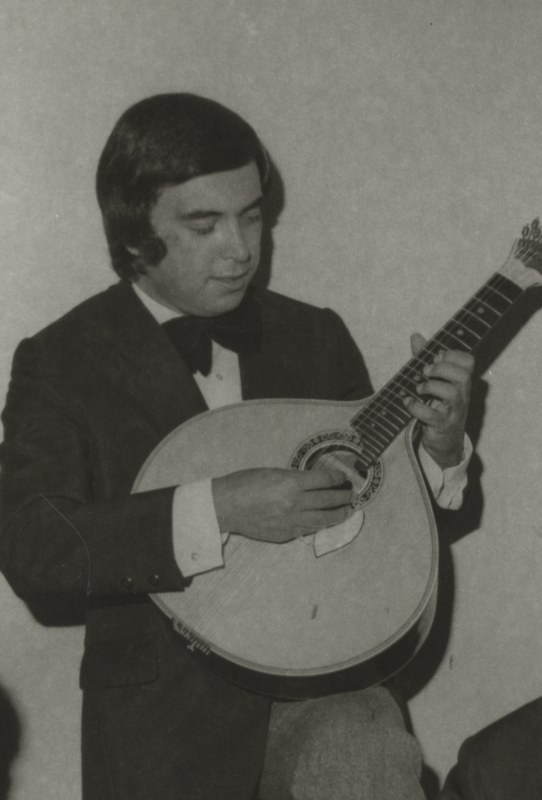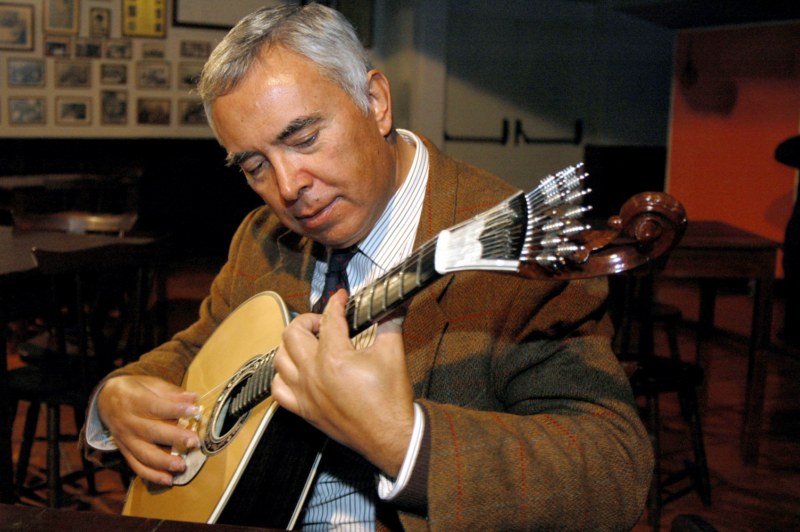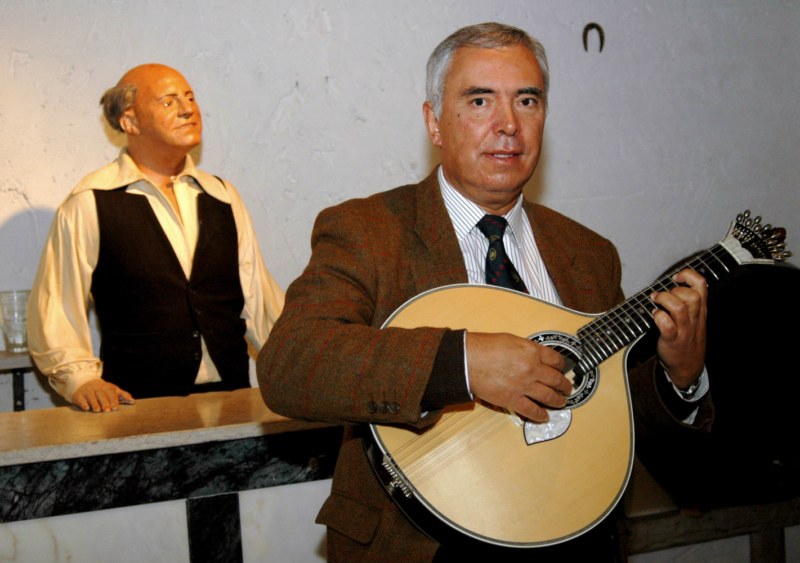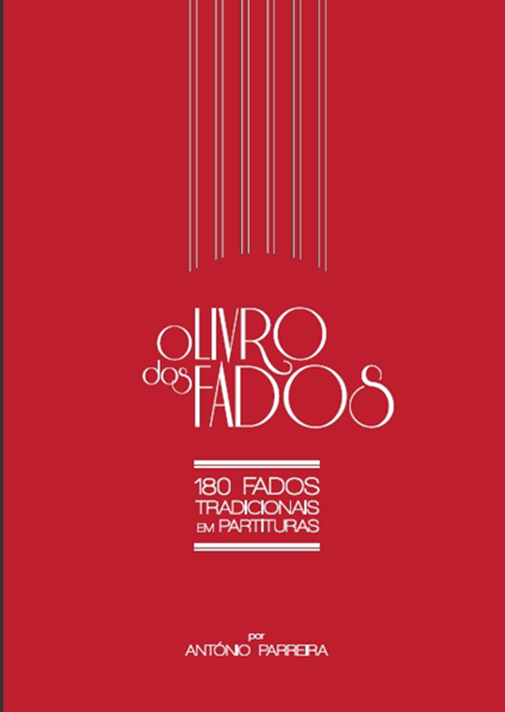Know more:
António Parreira
(N. 13 June, 1944)António Parreira (his full name is António Parreira Costa) was born in the Monte do Pero Pardo, parish of São Francisco da Serra, municipality of Santiago do Cacém, on the 13 June 1944, (although his birth record states that he was born on the 16 July).
At 14 (in 1958), influenced by an uncle of his who played Portuguese guitar, he learned to play the "fado corrido no quinto ponto", which he later came to know as “Fado Corrido in G"- a widespread tune at that time, very popular in his village. He learned his musical scores by listening to the Portuguese guitar programmes on the radio, namely at the Emissora Nacional broadcaster.
Another very interesting place at his village was "Tasca do Faúlha", owned by master "Tí" Jorge Chaínho, the father of António Chaínho, where they both played. Parreira played for the first time at this venue, in public, invited by those two musicians. He was then 15 years-old (1959).
Influenced by António Chaínho he learned Spanish guitar to accompany him, which he did for 3 years (1959-1962), until a kidney illness made him stop for 2 years.
In 1965, after his recovery, he did his military service, first in Elvas and then in Lisbon at the Military Police. He then travelled to Mozambique.
In this period he devoted himself exclusively to the Portuguese guitar. He had performances in several African countries, namely Malawi, Rhodesia, South Africa, Angola and Mozambique, always accompanied by Spanish guitar player Francisco Gonçalves, his comrade of arms and music partner for 33 years (1965-1998).
After finishing his military service he returned to his hometown, but visited Lisbon fado houses frequently and became known in the milieu.
Augusto Damásio, a fan of Portuguese guitar, introduced him to the owner of fado house "Guitarra da Madragoa" (at Rua da Esperança, in Lisbon), where he made his debut as professional guitar player on the 9 May 1969. At his house he met César Morgado, Eduarda Maria, Tristão da Silva and Fernando Maurício.
In 1970 he joined the cast of the restaurant "Guitarra de Alfama", followed by "Taverna d'El Rei", "Fragata Real, "Abril em Portugal", "Parreirinha de Alfama", "Luso", "Arreda", in Cascais, and lastly "Forte Dom Rodrigo", also in Cascais, owned by fado singer Rodrigo. As regards, he travelled with him through Portugal and abroad, stressing shows.
In 1973 he recorded solo "Guitarras de Portugal", accompanied by his partner Francisco Gonçalves (Spanish guitar).
Between 1976 and 1980 he had private lessons with the German professor Siegfried Zugg, learning how to read and write music.
Accompanying António Mourão, he travelled to many countries, namely Japan, Australia, Macao, New Zealand, all of Western Europe, African countries, namely South Africa, the United States of America, Canada, Venezuela, Colombia, Brazil, Argentina, Uruguay and many others.
In 1977 he accompanied Amália Rodrigues in Spain, on initiative of the Secretariat of State for Tourism, and performed for two weeks at Hotel Melia Castilla. In 1978 he accompanied Amália once more, at a show in Paris.
He appeared on television for the first time in the Zip Zip programme (1970), accompanying fado singer António dos Santos in jesting fados and ballads. Participation in many television shows followed.
He accompanied Alfredo Marceneiro both in fado houses and at television and recordings, as well as Maria Valejo, Tristão da Silva, Argentina Santos, Lucília do Carmo, Fernando Farinha, Carlos do Carmo and many others.
Among his recordings reference should be made to "Saudade", together with Japanese artist Saki Kubota (actually a Japanese music work with no links to fado), also accompanied by António Chaínho, Martinho D`Assunção and Pedro Nóbrega.
In 1989 he recorded with Amália Rodrigues, at a show for Spanish television, in the framework of a programme hosted by Sara Montiel. In that period he also worked frequently with singer Tonicha.
In 1992 he performed solo for three weeks at Hotel Oton Palace, in Rio de Janeiro, playing Portuguese music.
He accompanied fado singer Manuel de Almeida, (dead on the 3 December 1995) in the last 17 years of his life, joining him on several recordings:
In 1999 he compiled 120 Classic Fado Songs to be transcribed by Maestro Jorge Machado in his book "Notas de Música", in the framework of an edition called Um Século de Fado, by publisher Ediclube.
Among other musical scores, he composed the following for fado songs: "Recado", "Fado Marina", "Ribeira Nova", "Versos do Povo", "RR Mexilhão", "Fado Inês", "Gotas de Tristeza", "Isto de ser Poeta", "Contos e Contas", "Senhor Marquês de Pombal", "Ser Português", "Zé Guitarrista", "Violeta do Chiado" e "Para Não ver a Realidade".
Quoting from Proust, António Parreira states:
"Music is perhaps the only example of what could have been - had not it been the invention of language, the formation of words, the analysis of ideas - soul-to-soul communication."
It is perhaps due to this "soul-to-soul communication" – which he believes in -, that Master António Parreira managed to teach his son, Paulo Parreira (who admits it), the timbres and fascination that would also involve him in the magical chords of Portuguese Guitar.
This is so true that we know that his younger son, Ricardo Parreira, is also a virtuoso player of Portuguese Guitar, with a promising brilliant future. He was invited by Argentina Santos to play at the Tribute organised by the Casa do Fado e da Guitarra in her honour, on the 28 November 1999.
His love for Portuguese Guitar led him to rise to new challenges. Since 2001 he is a member of the faculty of the Portuguese Guitar School of the Casa do Fado e da Guitarra Portuguesa in Alfama, currently called Museu do Fado. He is proud of knowing and feeling that he is one of the persons who as given a more significant contribution to promote the evolution and learning of Portuguese Guitar. A mix of pacience and method, Master Parreira is a reference in the Museu do Fado School.
In 2007 he received a Career Award given by Casa da Imprensa.
On the 22nd of october of 2008 he was awarded the “Mérito Municipal” medal by Grândola’s Town Hall.
Six years later, in a Fado Museum edition, he launched “O Livro dos Fados – 180 Fados Tradicionais em Partituras”, a book with a priceless pedagogical value that, as stated on its title, comprises 180 traditional Fado scores, transcribed by António Parreira himself.
The record “Guitarra Portuguesa por António Parreira, Paulo Parreira e Ricardo Parreira”, edited in 2016 by HM Música, marks his return to the studio recordings. With his own musical direction and production, António Parreira shares the limelight with its two sons, who learned to play the guitar with him and became brilliant composers and performers of this instrument.
Source:
Museu do Fado – Interviewed on the 27 July 2006.

António Parreira, s/d.

António Parreira, s/d.

António Parreira Museu do Fado, 2005

O Livro dos Fados
-
Marcha Fadista António Parreira (António Parreira)